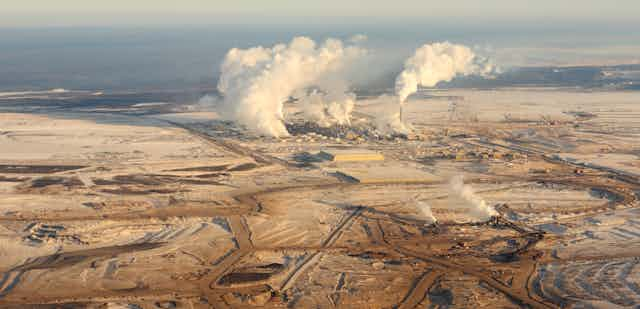The decision by Teck Resources, one of Canada’s largest mining companies, to suspend the Frontier oilsands project surprised many. Had it gone ahead, the open-pit mine would have been built across 24,000 acres of boreal forest just north of Fort McMurray, Alta.
Commentators have blamed everything from the low price of oil to regulatory and political uncertainty and insinuations of socialism. What is clear, however, is that the decision is another blow to a federal government struggling to achieve a balance between climate action and resource development.
The company’s letter announcing the decision specifically pointed out the need to bring climate policy and resource development into harmony. The letter provides few suggestions as to how this might happen; indeed, as others have pointed out, it can be interpreted as a call for either more or less regulation in energy projects.
Referring to the growing debate around these issues, the letter also indirectly acknowledged the protests and blockades that have appeared across Canada in recent weeks, driven by another, very different project — the Coastal GasLink pipeline that runs through Wet’suwet’en territory. New energy projects have never faced such an uncertain pathway to success.
Make rules, not decisions
Trudeau’s government has struggled with the tremendous challenge of reconciling climate policy and resource development. In an ideal world, this challenge could be met through better regulation — with a focus on reducing greenhouse gas emissions and, perhaps, other negative environmental impacts.
Canada’s Clean Fuel Standard is a good example of this kind of policy — it sets out clear rules that dictate that fuels be continually improved to reduce emissions. By comparison, Bill C-69, legislation that requires future infrastructure projects to be evaluated in terms of impacts on health, environment and communities, has been criticized for adding uncertainty to an already complicated process.

Bill C-69 is just one example of the Trudeau government’s focus on increasing Indigenous participation in making decisions about resource projects, and there has been some success on this front. Look at the support that 14 Métis and First Nation communities in Alberta gave to the Teck Frontier project, after long and productive engagement with the company, the province and Ottawa. Look at the positive words that some of the Wet'suwet'en have for the Coastal GasLink project. Engagement with Indigenous communities is proving fruitful, and in some cases common ground is emerging that can serve as the basis for future cooperation.
Building consensus
When dialogue between Indigenous peoples and resource companies sour, however, the ramifications are grim. The power of the current protests is found in the overlap between Indigenous sovereignty and environmental concern.
If consensus is a fundamental condition for a successful energy project, the emergence of these types of coalitions presents a challenge that may be difficult to overcome — and sows the seeds of uncertainty over every future project.
There has been a lot of work done to try to build consensus in recent years. In the case of Teck’s Frontier project, there was certainly Indigenous consultation, engagement and support from First Nations who have expressed disappointment in the company’s decision to shelve the project.
In the case of Coastal GasLink, signed agreements were in place with elected band councils, but the guidance of the hereditary chiefs was ignored, igniting the current wave of protest across the country. The presence of both Indigenous and settler peoples at these protests paints a picture of a country that remains hugely divided on the best way to develop our resources and power our future.
Read more: Coastal GasLink pipeline dispute is a nation-to-nation matter
Lost in all of this is that protests targeting specific projects, and not emissions in general, avoid the most basic problem of all. The root cause of climate change is not entirely industry, it’s also us. The protests that we are seeing in Canada do not even attempt to address this critical issue.
Addressing a climate crisis
There is growing demand for energy products — for heat, mobility and power. Nobody wants to live without the services that energy provides, preferably at relatively low cost.
Presumably a good portion of our future energy will come from renewable energy — but these types of projects are also being contested across the country by both Indigenous and environmental groups. For example, consider Site C, Muskrat Falls or the Nation Rise Wind Farm. Protesting against renewable energy options will slow down the transition away from fossil energy.
Canadians are asking, is it even possible for this country to build a major energy project anymore? The answer to that question must be yes.
The climate crisis adds urgency to the need to chart a new path. We are always going to need energy for heat, mobility and power.
Regulations designed to clean up our energy supply will require new projects to be built. Indigenous people have a voice at the table and must be respected, and legitimate environmental concerns must also be addressed. Let’s work together to figure out how to get new projects built — it’s the only way to address our climate emergency.

